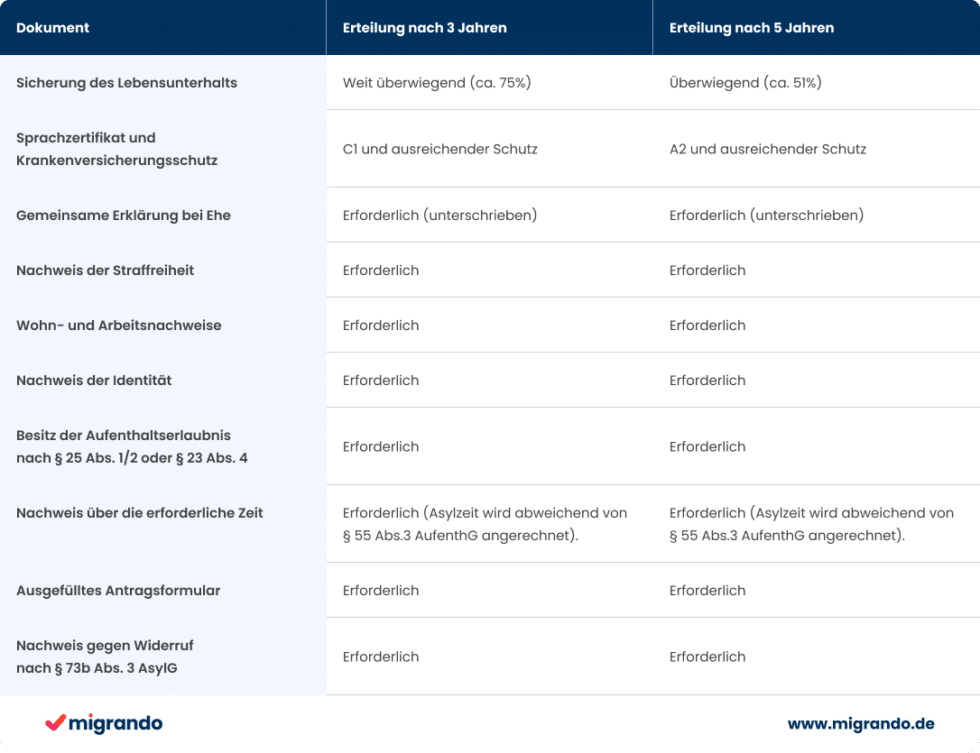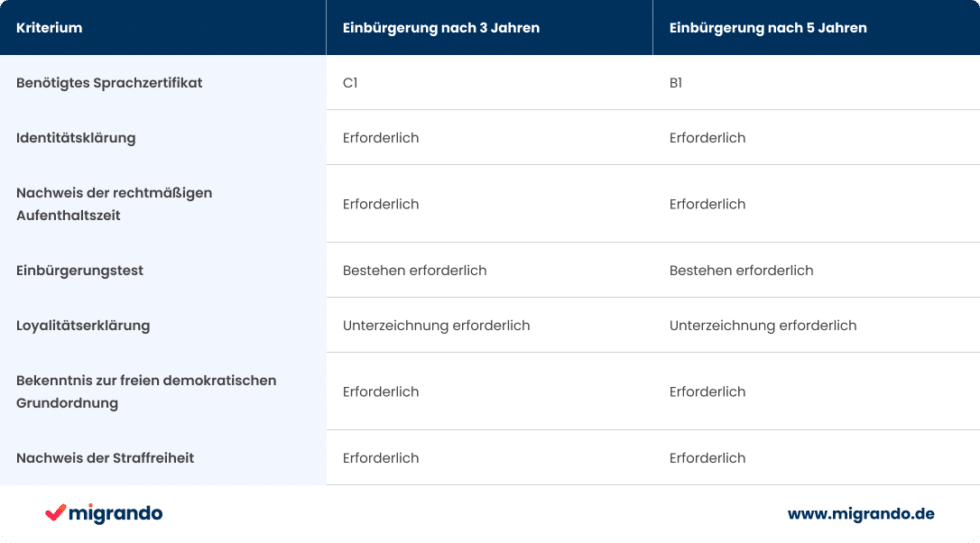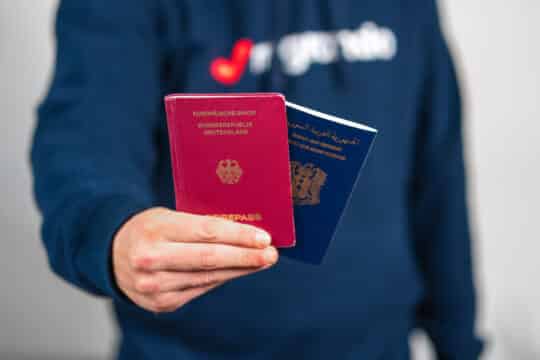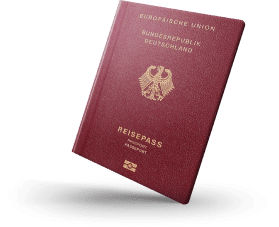What is § 26 para. 3 AufenthG?
Residence permit Section 26 (3) of the Residence Act is a Settlement permit for refugees and persons entitled to asylum. The prerequisite for obtaining this right of residence is that you are recognized as a refugee or person entitled to asylum in Germany and have been in possession of a residence permit in accordance with Section 25 (1) or (2) of the Residence Act for a certain period of time.
The Residence permit is part of the overarching law on the residence, employment, duration of residence and integration of foreigners in Germany in accordance with Section 26 of the Residence Act.
The grounds for the granting of Section 26 (3) AufenthG
The reasons for granting Section 26 (3) AufenthG are to give refugees and persons entitled to asylum a long-term perspective in Germany and, in addition to the possibility of applying for Naturalization from a certain point in time, to give them an unlimited Residence permit in the form of Settlement permit in accordance with Section 26 (3) AufenthG. This is intended to promote the further integration of people in Germany and give them the opportunity to plan for the long term.
Who can apply for § 26 para. 3?
Anyone who has a right of residence with refugee status(§ 25 Para. 2 Alt. 1 AufenthG) or subsidiary protection according to § 25 Para. 2 Alt. 2 AufenthG or a right of residence according to § 25 Para. 1 AufenthG or 23 Para. 4 AufenthG can generally apply for Residence permit § 26 Para. 3 AufenthG. This means that you have fled to Germany at a certain point in time for humanitarian reasons and have refugee or asylum status. From a certain point in time, you have the option of applying for a Settlement permit for refugees or persons entitled to asylum. The exact point at which you can apply depends on the conditions you meet.
How to apply for § 26 para 3 AufenthG?
There are two different options regarding the point in time from which the Residence permit § 26 Para. 3 Residence Act can be issued. The application process is the same in both cases. First, the documents for the application are organized and the application is compiled, then you contact your Foreigners' office and make an appointment. The application is handed in at the appointment and checked from then on. You will then receive a reply with the result of the application.

Requirements for Section 26 (3) AufenthG
The conditions for the issue of the Settlement permit § 26 para. 3 AufenthG may vary. In some respects, however, they are absolutely identical. This applies to financing, proof of the group of persons or proof of employment. The differences can be found in the amount of funding or the securing of subsistence and in the language certificates.
Proof of the authorized group of persons
The absolute basic requirement for the Settlement permit for refugees and persons entitled to asylum is that you belong to the group of eligible persons who can apply for such a Settlement permit . This means that you must either fall under Section 25 (1) AufenthG, Section 25 (2) AufenthG or Section 23 (4) AufenthG.
This means that you have been granted Residence permit asylum or refugee status. You can only apply for Residence permit Section 26 (3) AufenthG with this right of residence. An application from another Residence permit does not work. You must also provide proof of the necessary legal residence. In deviation from § 55 Para. 3 of the Asylum Act, the time you applied for asylum before obtaining a residence permit will also be taken into account.
Proof of financing
Another form of proof is that you have the necessary funding to enable you to apply for Settlement permit for refugees and persons entitled to asylum. This is done via the proof of means of subsistence.
Proof of financial means are the last 12 salary statements (if applicable also from the spouse according to § 9 paragraph 3 sentence 1 AufenthG) and other proof of financial means such as housing benefit notification, job center notification and BAföG notification.
In principle, you must prove that you have a secure means of subsistence . This only does not apply if you have reached the standard age limit according to § 35 sentence 2 AufenthG, i.e. if you have been living in Germany as a refugee for 5 years at the age of 16, or if you have reached the age of majority according to § 35 sentence 1 paragraph 2 and have been living in Germany for 5 years, or if you have a secure means of subsistence according to § 35 sentence 1 number 3 or are undergoing training or studies leading to a vocational training qualification or university degree.
Pension insurance history and proof of health insurance
It is important that you provide evidence of your pension insurance history. You must prove that you have paid money into the statutory German pension fund over a certain period of time.
You must also be able to present a current membership certificate from your health insurance company. This certificate must not be older than three months.
Further evidence for Section 26 (3) AufenthG
In addition to proof of pension insurance and proof of health insurance, there are other important documents that you will need to provide in order to obtain Residence permit for Section 26 (3) of the Residence Act. These include a C1 language certificate if you want to apply for the right of residence after 3 years and an A1 language certificate if you want to apply for Residence permit § 26 Para. 3 Residence Act after 5 years.
When applying for Settlement permit for your spouse, a key component of the application is, among other things, the joint declaration in which details of the marriage are provided. This form must be completed and signed truthfully, as untruths can lead to the withdrawal of the Settlement permit and the residence permit.
In addition, valid identity documents, such as passport and copies or alternative documents including data sheet, entry visa, stamps and labels, are required in order to make the vita of your entry traceable and to make the application successful.
The basis is also that you meet the requirements of Section 9 (2) sentence 1 numbers 4 to 6, 8 and 9. This includes that you are permitted to work and that you have sufficient knowledge of the German language. You can prove this by taking the naturalization test, which is organized by the Federal Office for Migration and Refugees.
Necessary documents for § 26 para 3 AufenthG
The documents required depend on the number of years after which you apply for Settlement permit . A distinction is made between the application after 3 years and the application after 5 years.
We have summarized the necessary documents for you here. If you present these documents, you will be granted Settlement permit in accordance with § 26 Para. 3:

Situation with possession of § 26 para. 3 AufenthG
Some things will change for you if you have the Settlement permit for refugees and persons entitled to asylum. There are advantages and disadvantages in relation to Section 26 (3) AufenthG and at the same time situations such as being absent from Germany for a longer period of time, which must be considered very carefully.
Advantages and disadvantages of Section 26 (3) AufenthG
Advantages:
- Clear advantage for persons with previous subsidiary protection status who are seeking Settlement permit for refugees and persons entitled to asylum.
- Easier path to family reunification, especially for those who previously had difficulties due to the current regulations.
- Significant simplification of the naturalization process, as many conditions are already fulfilled, which saves time and administrative effort.
- Possibility of traveling outside the home country without any problems for up to 6 months, as long as the absence is not exceeded and the Foreigners' Registration Office is informed in the event of a longer absence.
Disadvantages:
- If you are planning to stay away from Germany for longer than six months, you must contact Foreigners' office , which involves additional bureaucracy.
Travel to the home country with § 26 para. 3 Residence Act
Travel to your home country is not possible with Settlement permit § 26 Para. 3 AufenthG. Your Settlement permit states that you can travel to any country in the world except your home country. The reason for this is that you have applied for asylum because you are being politically persecuted or threatened in your home country.
Longer absence with § 26 para. 3 AufenthG
It is difficult to leave Germany for longer than 6 months with your Settlement permit in accordance with § 26 Para. 3 AufenthG. This would only work if you have already been living in Germany with your Residence permit for 15 years. If you do not communicate the absence to your Foreigners' office , there is a risk of complications due to excessive unannounced absences.
However, a return journey is possible regardless of whether your travel document or your Residence permit expires. You can obtain a visa to enter Germany from the relevant German embassy and travel back to Germany.
Revocation of Settlement permit for refugees
Under certain circumstances, it is possible that the issue of your Settlement permit for refugees will be withdrawn and revoked. The conditions for revocation apply in accordance with Section 51 AufenthG if the conditions for which you were granted the right of residence as the holder of the Settlement permit in accordance with Section 26 (3) AufenthG no longer apply.
A serious criminal offense according to § 54 AufenthG para. 1 no. 2-5 or para. 2 no. 5-7 can also lead to your Settlement permit being withdrawn. Such offenses are an offense against the free democratic basic order, offenses in connection with hatred and agitation, threats of violence against other people living in Germany or false statements to authorities.
Naturalization with § 26 para. 3 AufenthG?
The path from § 26 para. 3 AufenthG to the Naturalization
The path to Naturalization is quicker for you with your Settlement permit § 26 Para. 3 AufenthG than with other residence permits. In some cases, you already have the prerequisites, such as securing your livelihood, and therefore have less bureaucracy to deal with when organizing the necessary documents. The process itself is the same as when applying for a residence permit.
The step-by-step procedure for Naturalization with Section 26 (3) AufenthG
- Document organization: Start collecting your documents and research which documents are still missing.
- Contact Foreigners' office: Make an appointment with your local Foreigners' office to submit your application.
- Preparing your application: Sort your documents, complete the naturalization application and submit it to Foreigners' office on time on the agreed date.
- Application review: Foreigners' office will review your application within 12 weeks. If no response is received, an appeal Lawsuit for failure of act before the administrative court is possible.
- Awarding of the certificate: After a positive application check, an appointment will be made for the awarding of the certificate. Once you have received your naturalization certificate, you are a German citizen.
Required documents and proof with § 26 para. 3 AufenthG
The Naturalization in accordance with § 26 Para. 3 AufenthG requires certain documents, some of which may already be available, including proof of livelihood, which is also necessary for the Residence permit .
The requirements vary depending on whether you have applied for Settlement permit after 3 or 5 years:

The new Naturalization Act, which comes into force on 27.6.2024, shortens the naturalization period to 5 years, which is a positive change. In particular, if you apply after 3 years and have a C1 certificate, you could receive Naturalization after just 3 years, as this is considered an integration achievement. This change offers a faster way to obtain citizenship and recognizes integration efforts.
Summary
As you can see, the topic of Settlement permit is very complex for refugees and persons entitled to asylum in accordance with Section 26 (3) AufenthG. We have summarized the most important points for you below:
- People who previously had a residence permit in accordance with § 25 Para. 1 AufenthG, § 23 Para. 4 AufenthG or § 25 Para. 2 AufenthG are granted a Settlement permit § 26 Para. 3 AufenthG. In other words, refugees or persons entitled to asylum.
- Important requirements for obtaining a permit are proof of livelihood, proof of residence, proof of employment contract, proof of health insurance and proof of the last 12 payslips. Proof of language skills must also be provided.
- The spouse can also submit proof of residence, proof of livelihood and proof of employment contract.
- When applying after 3 years, 75 percent of living expenses must be covered and a C1 language certificate must be presented in addition to all other requirements.
- When applying after 5 years, you must be able to prove that you have 51 percent of your living expenses covered, as well as an A2 language certificate and all other conditions.
- Travel to the home country is not possible under Section 26 (3) AufenthG.
- The advantages of Section 26 (3) AufenthG are the fulfilment of some naturalization requirements and the uncomplicated application for family reunification, which was previously complicated for persons in need of subsidiary protection.
Do you still have questions?
Residence permit Section 26 (3) AufenthG is a Settlement permit for refugees and persons entitled to asylum. The basic requirement is to have previously held a Residence permit Section 25 (1) or 25 (2) AufenthG.
Refugees and persons entitled to asylum who were previously in possession of Residence permit § 25 Para. 1 and § 25 Para. 2 AufenthG can apply for Settlement permit for refugees and persons entitled to asylum. The most important requirements include proof of livelihood, at least an A2 language certificate, proof of health insurance and proof of residence.
The major advantage of Section 26 (3) AufenthG is the possibility to travel to your home country. In addition, Naturalization can be achieved more easily than before due to pre-existing conditions. For people who previously had subsidiary protection status, family reunification is also easier to achieve.
The Naturalization works in the same way with § 26 Para. 3 AufenthG as with other residence permits. The advantage is that, as a holder of the Naturalization for refugees and persons entitled to asylum, you already fulfill one condition by securing your livelihood. If you have already applied for § 26 Para. 3 after 3 years, then you are in possession of a C1 certificate, which would fulfill another requirement. For Naturalization , organize your documents, make an appointment with Foreigners' office and submit your application. The authority will then check your application and inform you of the positive result. You will then become a German citizen when you receive your certificate.
Yes. Residence permit Sec. 26 (3) AufenthG is a Settlement permit and therefore unlimited Residence permit. You do not have to extend Residence permit Section 26 (3) because it is valid forever. Your Residence permit can only be withdrawn in the event of serious criminal offenses.
No. Your passport states that you can travel to all countries worldwide except your home country. If you travel to your home country and are arrested, you will not receive any support or assistance from the German state.










